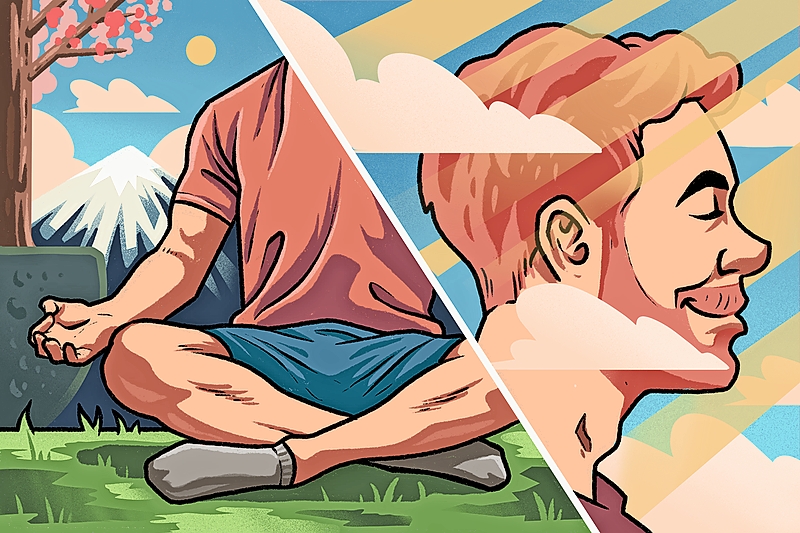Every Moment Matters
By Mark Loehrke
Appears in the April 2022 issue.

Perhaps it’s understandable that many people have wanted to look beyond their present circumstances over the past couple of years. But Bruce Malak believes a lack of focus on and an appreciation for the here and now is a common human condition that was all too prevalent long before the pandemic settled in for its unwelcome run.
Malak is a practitioner of mindfulness, which he defines as moment-to-moment awareness, or committed attention to what is happening right now—without judgment and without any story of what should be, will be, or might have been. He has been guiding people on this journey for more than 25 years as a mental health and mindfulness professional.
As the owner of Naperville Meditation and Mindfulness Consulting, Malak is known for helping individuals put what’s seen as an abstract idea into daily practice.
“Mindfulness and meditation is a way of life,” he says.
Pursuing a mindful state
To practice mindfulness is to observe what we are doing and returning to it when we are distracted, Malak says, noting that meditation often goes hand in hand with mindfulness. As an example, he recommends consciously paying attention to one’s breath and returning to that place whenever a thought distracts.
Even doing this for a mere five minutes a day, he says, can help a person become more familiar with how the mind works and better understand how we very often misinterpret what is actually happening.
“Often our minds are telling us stories that are not happening, leading us to states of confusion, worry, anxiety, anger, and sometimes even outrage,” he explains. “That’s not a very peaceful place to be.”
The benefits of awareness
Malak says that when a person practices mindfulness and meditation, he or she learns to observe thoughts and feelings as passing events in the mind without falsely enhancing them and without reacting to them on automatic pilot.
By enhancing important character traits like patience, curiosity, acceptance, kindness, and generosity—both to oneself and to others—that pattern can be broken.
“Realizing that my thoughts and feelings are largely just visitors is vital—it means the conditions we face are also not permanent,” he says. “Our behavior can help change those conditions, or at least soften them. Are my intentions and actions to change a condition appropriate and peaceful or not? The answer to that question is truly up to us.”
Simple steps for daily life
Malak says the first step toward greater mindfulness is to recognize and respond appropriately to any impediments. For example, if one becomes aware of the feeling of rising anger, mindfulness teaches to take a step back and practice patience.
The potential impediment of indifference, meanwhile, can be overcome by practicing compassion. The key is to put in the work.
“There is no everlasting tranquil state of being that we are able to reach, but mindfulness does provide a greater sense of peace and happiness each day,” Malak notes.
“It is a daily commitment that lessens our suffering and enhances our peacefulness one moment at time with the intention to help make the planet a better place for all of us.”
Illustration by Kevin Sterjo


